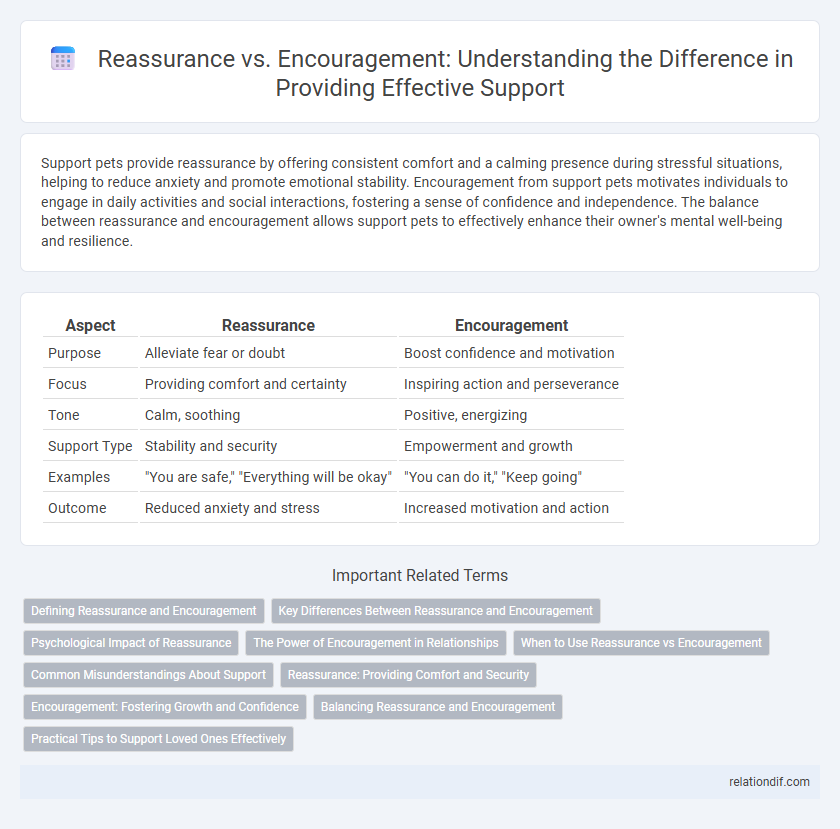Support pets provide reassurance by offering consistent comfort and a calming presence during stressful situations, helping to reduce anxiety and promote emotional stability. Encouragement from support pets motivates individuals to engage in daily activities and social interactions, fostering a sense of confidence and independence. The balance between reassurance and encouragement allows support pets to effectively enhance their owner's mental well-being and resilience.
Table of Comparison
| Aspect | Reassurance | Encouragement |
|---|---|---|
| Purpose | Alleviate fear or doubt | Boost confidence and motivation |
| Focus | Providing comfort and certainty | Inspiring action and perseverance |
| Tone | Calm, soothing | Positive, energizing |
| Support Type | Stability and security | Empowerment and growth |
| Examples | "You are safe," "Everything will be okay" | "You can do it," "Keep going" |
| Outcome | Reduced anxiety and stress | Increased motivation and action |
Defining Reassurance and Encouragement
Reassurance involves providing comfort and confidence to reduce anxiety and doubts, often emphasizing safety and stability. Encouragement focuses on motivating and inspiring individuals to take action and overcome challenges by boosting their self-belief. Both play crucial roles in emotional support, with reassurance calming fears and encouragement fostering growth and resilience.
Key Differences Between Reassurance and Encouragement
Reassurance involves alleviating doubts and calming fears by confirming stability or safety, while encouragement motivates action and boosts confidence through positive reinforcement. The key difference lies in reassurance addressing emotional uncertainty, whereas encouragement specifically fosters proactive behavior and resilience. Both play complementary roles in effective support but target different psychological needs.
Psychological Impact of Reassurance
Reassurance provides immediate relief by reducing anxiety and fostering a sense of safety through affirming feelings and validating experiences, which helps stabilize emotional states. It activates the brain's parasympathetic nervous system, leading to decreased stress levels and improved coping mechanisms during uncertain or distressing situations. Regular reassurance strengthens trust and emotional security, making individuals more resilient to future challenges and psychological distress.
The Power of Encouragement in Relationships
Encouragement strengthens relationships by fostering trust, motivation, and emotional well-being, enabling partners to face challenges with confidence. Unlike mere reassurance, which offers temporary comfort, encouragement inspires growth and resilience through positive affirmation and support. Consistent encouragement creates a foundation of mutual respect and shared optimism, essential for long-term relational success.
When to Use Reassurance vs Encouragement
Reassurance is most effective when addressing immediate fears or doubts, providing comfort by affirming safety and stability in uncertain situations. Encouragement suits scenarios focused on growth and motivation, inspiring confidence and resilience to overcome challenges or pursue goals. Choosing between reassurance and encouragement depends on whether the priority is emotional calm or proactive empowerment.
Common Misunderstandings About Support
Common misunderstandings about support often confuse reassurance with encouragement, assuming both serve the same purpose in fostering growth. Reassurance reassures by validating feelings and reducing anxiety, while encouragement motivates action and resilience by focusing on potential and effort. Effective support balances these elements, ensuring emotional safety without diminishing the drive for progress.
Reassurance: Providing Comfort and Security
Reassurance offers comfort and security by addressing fears and uncertainties through empathetic communication and consistent support. It strengthens emotional resilience by validating feelings and reducing anxiety in challenging situations. Effective reassurance creates a safe environment where trust and confidence can grow.
Encouragement: Fostering Growth and Confidence
Encouragement plays a vital role in fostering personal growth and building confidence by highlighting strengths and potential rather than just providing comfort. Positive reinforcement and constructive feedback motivate individuals to overcome challenges and develop resilience. This approach promotes a growth mindset essential for long-term success and self-improvement.
Balancing Reassurance and Encouragement
Balancing reassurance and encouragement in support requires fostering confidence while promoting growth mindset. Effective support blends reassurance to reduce anxiety with encouragement that motivates action and resilience. This balance cultivates a positive environment where individuals feel safe yet challenged to achieve their potential.
Practical Tips to Support Loved Ones Effectively
Reassurance emphasizes providing comfort and alleviating anxiety by affirming safety and stability, while encouragement focuses on motivating action and fostering confidence in facing challenges. To support loved ones effectively, acknowledge their feelings genuinely, use calm and positive language, and offer specific, achievable steps to help them move forward. Combining empathetic listening with tailored guidance strengthens trust and promotes emotional resilience.
Reassurance vs Encouragement Infographic

 relationdif.com
relationdif.com